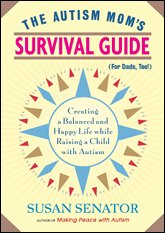Susan Senator
All happy families are not alike...

How do two people who are so many things to each other (friend, partner, diaper changer, breadwinner, bread baker, autism teammate) switch gears and go back to being lovers? It is tough in any kind of family, but with autism in the mix, the intimacy situation between spouses can be an even bigger challenge. We’re worried about making it to various appointments and are dealing with the constant educational and therapeutic issues that crop up—everything from learning yet again that a speech therapy session in school did not happen to wondering how to toilet train, to getting a child to sleep the whole night or to stop biting. My friend Nancy Bea put it this way: “We are not weird if we’re not having sex. It should be OK to admit that with autism in the family it’s really hard to have any kind of sex life.”
Of course it’s not weird if autism parents stop having sex, but it’s also true that we don’t have to put this aspect of our lives on hold either. Most of us don’t want to disconnect sexually from our partners, but how do we prevent it, with such a lot on our plates? We all know that a person’s sex drive can be buried under family needs, long work hours, health and self-esteem issues, even boredom. We also know that autism can compound any of the above. However, once begun, sex is always worth the effort. It is so oddly ironic that now, married and older, we think of sex as something to work at, just as, when we’re young, it takes willpower not to do it! Nevertheless, I do know that sex is and will always be a key ingredient to my personal happiness, particularly in a long-term relationship such as a marriage. But knowing something and feeling it do not always go hand in hand, especially with something as complex as sexuality, where there can be many disconnects between what you want in your mind and heart and what your body can do.
The psychologists and autism moms I contacted confirmed that most of us are focused on just getting through the day. In our harried lives, it is so easy just to let sexuality go. Dr. Sharon Waller, a clinical psychologist in Brookline, Massachusetts, says, “In my therapy sessions with autism moms, it’s hard to get them to focus on themselves. The way they use the time we have together is to talk about their child. Their therapy is primarily about getting validation and support for their decisions related to treatment options for their child, the IEP process [Individualized Education Program], and addressing behavioral challenges in their children. When they do refer to their marriages, they might say in passing, ‘We never have sex anymore.’”
Dr. Waller points out that having children often strains a marriage, whether the children have special needs or not. “The research points to a decline in marital satisfaction once children arrive,” she says. However, the difference autism makes is in the frequency and intensity of the problems. When raising an autistic child, challenges crop up again and again, often unpredictably…
We owe it to ourselves to make sure that there’s room for intimacy in our lives. No matter what we are up against, love is a basic human need, necessary for our personal nourishment. It is indeed possible to honor this need, but in order to do so, we have to acknowledge that it is really OK , and not selfish, to want this. So how can people dealing with autism in their lives allow themselves personal pleasure and connection, given their busy, demanding, and stressful lives?
The more I asked around, gently, about marital happiness and thought about the frustrated responses I got, the more I realized that the only way to approach these dilemmas at all is to start with small, simple goals. Ned has often said to me, “If you want to make a change, start with one easy thing today.” In other words, set yourself up for success. If we go around thinking of ourselves as “never having sex,” and if we go right to “Oh, just forget it,” then that door will probably stay closed longer than it has to…
Copyright 2010, Susan Senator